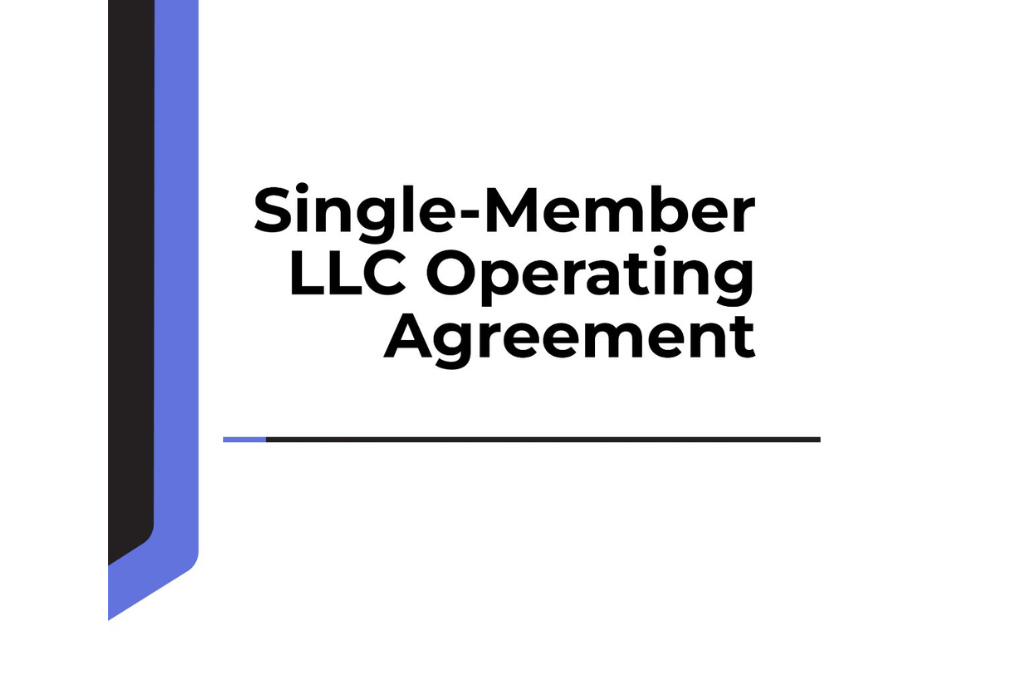Why Your Single-Member LLC Needs an Operating Agreement (and What to Include)
You’ve taken the crucial step of forming a Single-Member LLC (SMLLC) to protect your personal assets and legitimize your business. You filed your Articles of Organization and received your official documents from the state. Now, you might be thinking, “I’m the only owner, so I don’t need any more internal paperwork, right?”
This is one of the most common and dangerous misconceptions among solo entrepreneurs.
An LLC Operating Agreement is an internal document that outlines the governance and operational rules of your business. Even though you are the only member, creating one is one of the most important actions you can take to secure your business’s future. Here’s why it’s essential and what you need to include.
Why an Operating Agreement is Non-Negotiable
Think of an Operating Agreement as the constitution for your business. It’s your opportunity to put the rules in writing, and for a solo owner, it serves four critical purposes:
1. To Solidify Your Liability Shield (The “Corporate Veil”)
The primary reason you formed an LLC was to create a legal barrier—the “corporate veil”—between your personal assets and your business debts. An Operating Agreement is a powerful piece of evidence that you are treating your LLC as a separate, legitimate business entity. If your business is ever sued, a court could potentially “pierce the corporate veil” and go after your personal assets if it finds you didn’t maintain this separation. An Operating Agreement is your first line of defense.
2. To Gain Credibility with Banks and Financial Institutions
When you go to open a business bank account, apply for a loan, or seek investment, you will likely be asked to provide your LLC’s Operating Agreement. It proves you are the sole owner, have the authority to act on behalf of the company, and have established formal business procedures. Lacking this document can make your business appear unprofessional and may delay or prevent crucial financial transactions.
3. To Plan for the Future (Succession Planning)
What happens to your business if you unexpectedly pass away or become incapacitated and unable to run it? An Operating Agreement allows you to create a succession plan. You can name a successor to take over, or outline the specific steps for how the business should be wound down and its assets distributed. Without it, your business could be tied up in a lengthy and expensive court process.
4. To Override State Default Rules
If you don’t create an Operating Agreement, your LLC is automatically governed by the default rules of the state where it was formed. These generic rules are not tailored to your specific business needs. An Operating Agreement puts you in control, allowing you to define your own rules for governance, even as a single owner.
What to Include in Your Single-Member LLC Operating Agreement
Creating this document doesn’t have to be complicated. A strong SMLLC Operating Agreement should clearly and simply cover the following key areas:
- 1. Company Formation and Purpose:
State the official name of the LLC, the date of formation, and the address of its principal place of business. Briefly describe the purpose of your business. - 2. Membership and Ownership:
Clearly state that you are the sole member and that you own 100% of the interest in the LLC. - 3. Management Structure:
Specify that the LLC is “member-managed” and that you, as the sole member, have full and complete authority to manage and make decisions for the company. - 4. Capital Contributions:
Describe your initial investment (capital contribution) to the LLC. This can be cash, property, or services. Documenting this is crucial for establishing the financial separation of your business. - 5. Profits, Losses, and Distributions:
Outline how profits and losses will be handled and how you will take money out of the business (known as “distributions” or “draws”). As a single owner, you have flexibility, but it’s good practice to document the process. - 6. Succession and Dissolution:
This is your formal succession plan. Detail what should happen to the LLC and its assets upon your death or disability. You can name a person to wind down the business or specify that it should be transferred to an heir.
A Small Step for Major Protection
Taking an afternoon to draft and sign an Operating Agreement is a small investment that pays huge dividends in legal protection, credibility, and peace of mind. It formalizes your role as the business owner and ensures the liability protection you worked to create remains strong and intact.
Navigating legal documents can feel intimidating, but it’s a vital part of building a resilient business. At Empire Ecommerce, we don’t just help you form your LLC—we ensure you have the foundational documents in place for long-term success.
Protect your assets and professionalize your business today. Contact Empire Ecommerce for a free consultation, and let us help you draft a rock-solid Operating Agreement for your Single-Member LLC.







